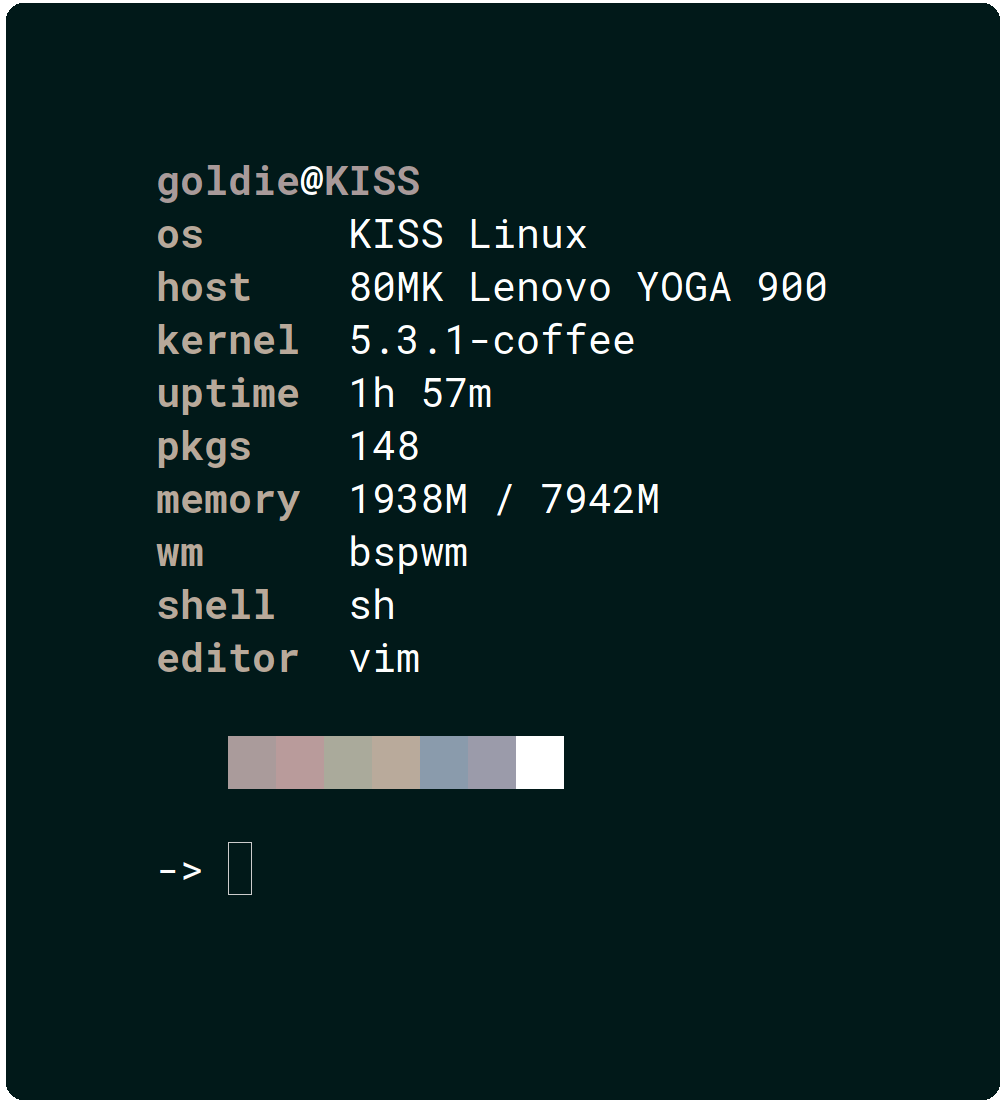A pretty system information tool written in POSIX sh
The goal of this project is to implement a simple system
information tool in POSIX sh using features built into
the language itself (where possible).
The source code is highly documented and I hope it will
act as a learning resource for POSIX sh and simple
information detection across various different operating
systems.
If anything in the source code is unclear or is lacking in its explanation, open an issue. Sometimes you get too close to something and you fail to see the "bigger picture"!
- Linux
- Alma Linux, Alpine Linux, Arch Linux, Arco Linux, Artix Linux, AmogOS, CentOS, Dahlia, Debian, Devuan, Elementary, EndeavourOS, EvolutionOS, Fedora, Garuda Linux, Gentoo, Guix, Hyperbola, instantOS, KISS Linux, Linux Lite, Linux Mint, Mageia, Manjaro, MX Linux, NixOS, Nobara, OpenSUSE, Oracle, Parabola, Pop!_OS, PureOS, Slackware, Solus, SteamOS, Ubuntu, Vanilla OS and Void Linux.
- All other distributions are supported with a generic penguin logo.
- Android
- BSD
- DragonflyBSD, FreeBSD, NetBSD and OpenBSD.
- Windows
- WSL, Cygwin, MSYS and MinGW.
- Haiku
- macOS
- Minix
- Solaris
- IRIX
- SerenityOS
- MorphOS
- Hurd
- Arch Hurd, Debian
- All other distributions are supported with a generic Hurd logo.
pfetch is configured through environment variables.
# Which information to display.
# NOTE: If 'ascii' will be used, it must come first.
# Default: first example below
# Valid: space separated string, or 'all'
#
# OFF by default: shell editor wm de palette disk term resolution
PF_INFO="ascii title os host kernel uptime pkgs memory"
# Example: Only ASCII.
PF_INFO="ascii"
# Example: Only Information.
PF_INFO="title os host kernel uptime pkgs memory"
# A file to source before running pfetch.
# Default: unset
# Valid: A shell script
PF_SOURCE=""
# Separator between info name and info data.
# Default: unset
# Valid: string
PF_SEP=":"
# Enable/Disable colors in output:
# Default: 1
# Valid: 1 (enabled), 0 (disabled)
PF_COLOR=1
# Color of info names:
# Default: unset (auto)
# Valid: 0-9
PF_COL1=4
# Color of info data:
# Default: unset (auto)
# Valid: 0-9
PF_COL2=9
# Color of title data:
# Default: unset (auto)
# Valid: 0-9, COL1
# Setting to COL1 makes the color the same as COL1
PF_COL3=1
# Alignment padding.
# Default: unset (auto)
# Valid: int
PF_ALIGN=""
# Which ascii art to use.
# Default: unset (auto)
# Valid: string
PF_ASCII="openbsd"
# The below environment variables control more
# than just 'pfetch' and can be passed using
# 'HOSTNAME=cool_pc pfetch' to restrict their
# usage solely to 'pfetch'.
# Which user to display.
USER=""
# Which hostname to display.
HOSTNAME=""
# Which editor to display.
EDITOR=""
# Which shell to display.
SHELL=""
# Which desktop environment to display.
XDG_CURRENT_DESKTOP=""
# Override the value of os
PF_OS=""
# Override the value of host
PF_HOST=""
# Show/Hide Package Manager names
# Default: off
# Valid: on, tiny, off
# Example:
# on: '1748 (rpm), 11 (flatpak)'
# tiny: '1759 (rpm, flatpak)'
# off: '1759'
PF_PACKAGE_MANAGERS="on"
# Disable individial package managers
# Default: unset (none)
# Valid: package manager name (first arguement passed to the count_pkg function)
PF_DISABLED_PACKAGE_MANAGERS=""
# Mount point for the disk you want to display in disk info
# Default: '/' (except on iOS where it is /private/var, and on Android where it is /data)
# Valid: string
PF_DISKPATH="/"
